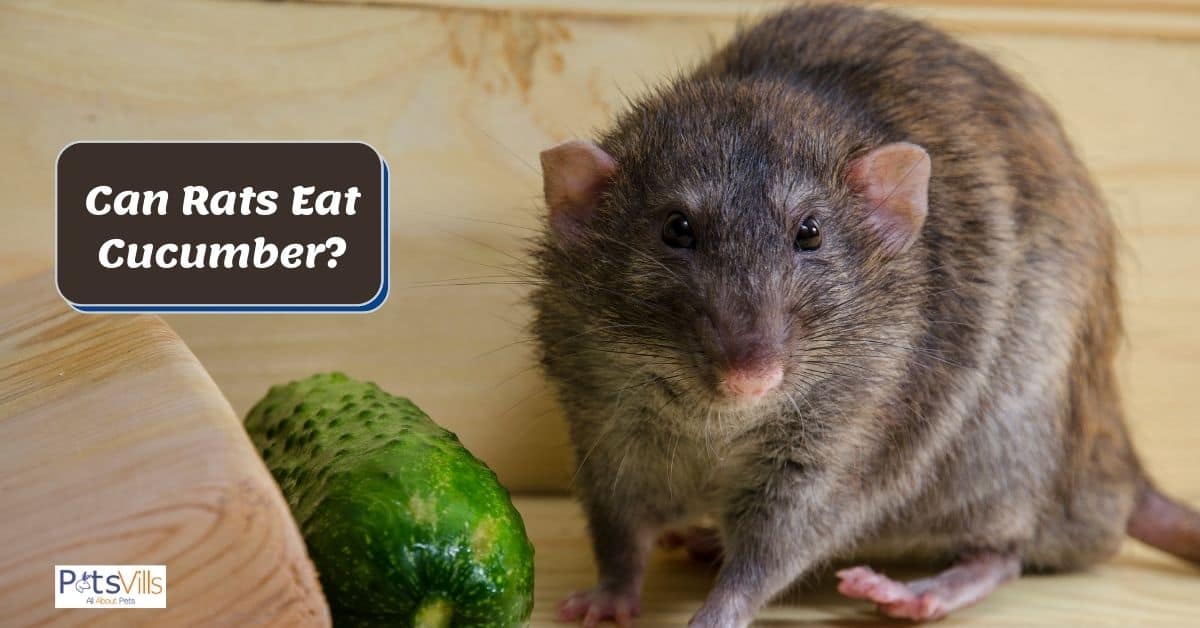Many people believe that cucumbers are a vegetable, but in fact, cucumbers are categorized as a fruit. If you are considering feeding your pet rat cucumber, you may be wondering if it is safe for them to consume. In this article, we will explore whether rats can eat cucumber and discuss the importance of providing a balanced diet for your furry friend. We will also provide alternative fruits and vegetables that are safe for rats to eat.
Can Rats Eat Cucumber?
The short answer is yes, rats can eat cucumber. Cucumbers are a great treat for rats when given to them in small amounts. However, it is important to note that cucumbers are very high in water content and can cause diarrhea if overfed. Therefore, it is crucial to feed cucumbers to rats in moderation.
Preparing Cucumber for Your Rat
Before giving cucumber to your rat, it is important to make sure it has been thoroughly washed. Like any other fruit or vegetable, cucumbers may have been exposed to pesticides or other chemicals. Washing the cucumber will help remove any potential harmful substances.
Next, chop the cucumber into small, bite-sized pieces. Rats have small mouths and may struggle to eat large chunks of cucumber. By cutting the cucumber into smaller pieces, you are making it easier for your rat to consume.
Cucumber is a Treat: Feed in Moderation
While cucumber can be a healthy addition to your rat’s diet, it should be considered as a treat rather than a staple food. The high water content in cucumbers means that they are low in nutrients compared to other fruits and vegetables. It is important to provide your rat with a balanced diet that includes a variety of foods to ensure they receive all the necessary vitamins and minerals.
Benefits of Cucumber: Are They Good for Rats?
Despite their low nutritional value, cucumbers do offer some health benefits to rats. The high water content in cucumbers can help keep your rat hydrated, especially during hot summer months. Additionally, cucumbers are low in calories, making them a suitable snack for rats who are prone to weight gain.
Cucumbers also contain a decent amount of vitamin K, which is essential for blood clotting and bone health. Furthermore, they are a good source of antioxidants, which help protect the body against damage from harmful free radicals.
Can Rats Eat Cucumber Skin?
Yes, rats can eat cucumber skin. The skin of a cucumber is safe for rats to consume and contains additional fiber, which can aid in digestion. However, make sure to wash the cucumber thoroughly before feeding it to your rat to remove any potential chemicals or pesticides.
Can Rats Eat Cucumber Seeds?
Rats can eat cucumber seeds without any issues. The seeds are safe for consumption and provide a small amount of additional nutrients. However, it is important to note that rats may selectively eat the fleshier parts of the cucumber and leave the seeds behind. This is perfectly normal behavior.
What Other Fruits Can Rats Eat? (Alternatives)
In addition to cucumbers, rats can enjoy a variety of fruits in moderation. Some safe fruits for rats include:
1. Apples: Remove the seeds and core, and slice the apple into small pieces.
2. Bananas: Offer small pieces of banana as a treat.
3. Blueberries: These antioxidant-rich berries are a great snack for rats.
4. Grapes: Cut grapes into smaller pieces to prevent choking hazards.
5. Melons: Watermelon and cantaloupe are hydrating fruits that rats can enjoy.
What Other Vegetables Can Rats Eat? (Alternatives)
Rats can also consume a variety of vegetables. Some safe options include:
1. Carrots: Rats love carrots, which are high in vitamin A and fiber.
2. Broccoli: Offer small florets of steamed or raw broccoli.
3. Peas: Provide plain, cooked peas as a nutritious snack.
4. Spinach: This leafy green vegetable is packed with vitamins and minerals.
5. Bell peppers: Offer small slices of bell peppers as a crunchy treat.
Remember to introduce new foods to your rat’s diet gradually and in small amounts. This will help prevent any digestive upsets and allow you to monitor your rat’s individual reactions to different foods.
FAQs
What should you not feed rats?
While rats can eat a variety of fruits and vegetables, there are some foods that should be avoided. Do not feed rats the following:
1. Chocolate: Chocolate is toxic to rats and can lead to severe health issues.
2. Citrus fruits: Citrus fruits contain high levels of acidity, which can irritate a rat’s digestive system.
3. Onions and garlic: These foods can cause damage to a rat’s red blood cells if consumed in large amounts.
4. Avocado: Avocado contains a toxin called persin, which can be harmful to rats.
5. Dairy products: Rats are lactose intolerant and should not be given dairy products.
Can rats eat cheese?
Contrary to popular belief, rats are lactose intolerant and should not be given cheese or any other dairy products. Feeding rats cheese can result in digestive issues, including diarrhea.
Can rats eat lettuce?
Lettuce can be fed to rats in small amounts, but it should not be the main component of their diet. Lettuce contains a high percentage of water and offers little nutritional value. Opt for darker, leafy greens like spinach or kale instead.
Conclusion
In conclusion, rats can eat cucumber, but it should be given to them in moderation. Cucumbers are high in water content and can cause diarrhea if overfed. Additionally, cucumbers are low in nutrients compared to other fruits and vegetables, so it is important to provide a balanced diet for your rat. Remember to wash the cucumber, chop it into small pieces, and introduce new foods gradually. Offering a variety of fruits and vegetables will ensure that your rat receives all the necessary nutrients for a healthy and happy life.
